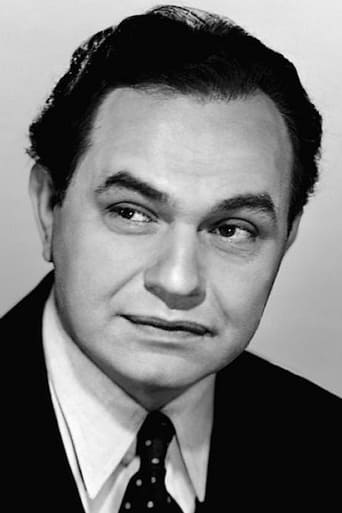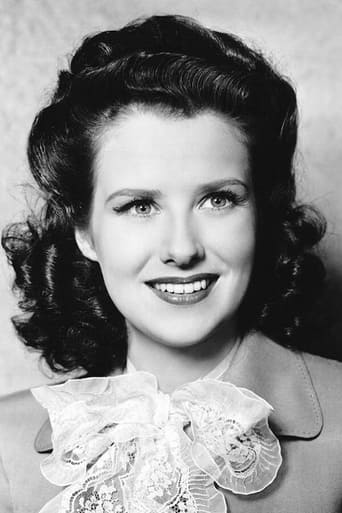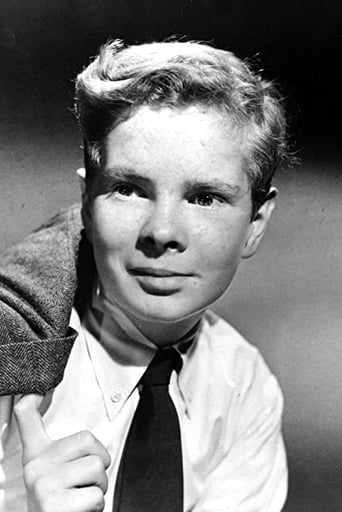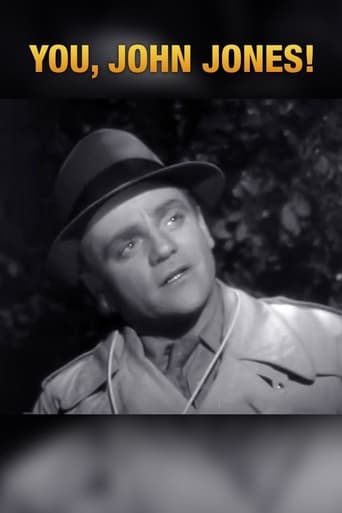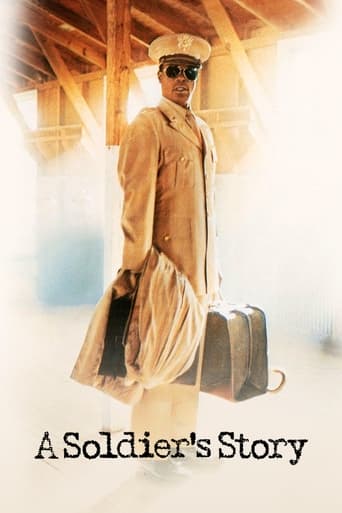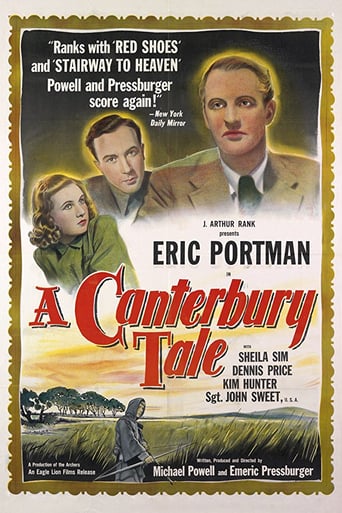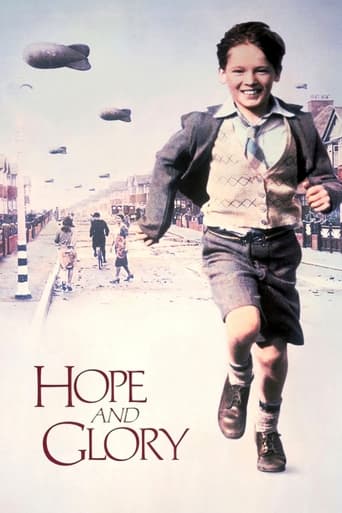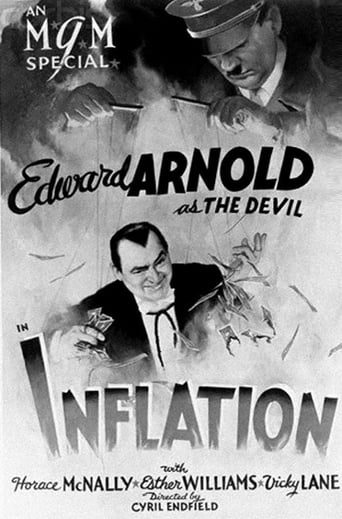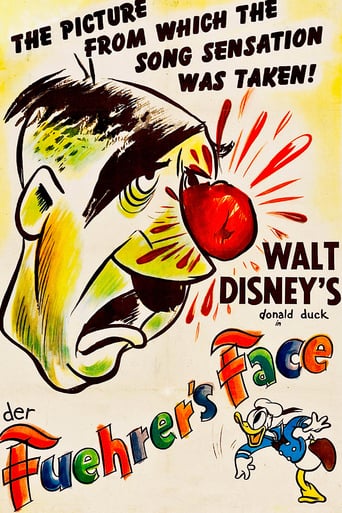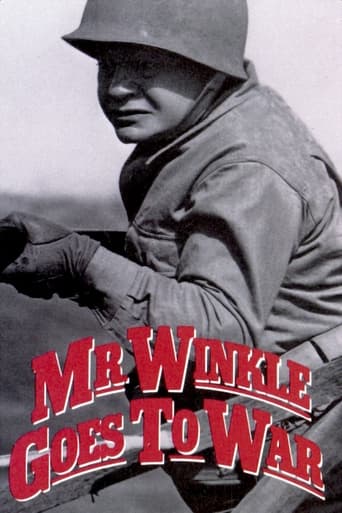
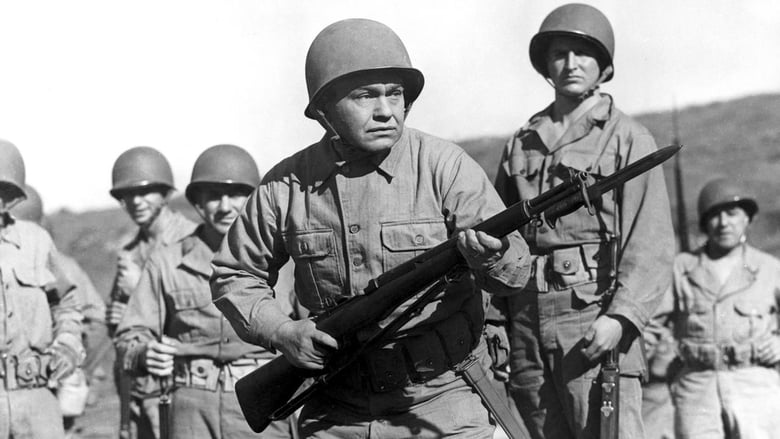
Mr. Winkle Goes to War (1944)
Wilbert Winkle, a henpecked, mild-mannered, middle-aged bank clerk and handyman finds himself in the midst of battle in the South Pacific.
Watch Trailer
Cast
Similar titles


Reviews
Entertaining from beginning to end, it maintains the spirit of the franchise while establishing it's own seal with a fun cast
The movie's neither hopeful in contrived ways, nor hopeless in different contrived ways. Somehow it manages to be wonderful
It's a feast for the eyes. But what really makes this dramedy work is the acting.
An old-fashioned movie made with new-fashioned finesse.
Copyright 3 August 1944 by Columbia Pictures Corp. New York opening at Loew's Criterion: 2 August 1944. U.S. release: 3 August 1944. Australian release: 15 February 1945. 7,315 feet. 80 minutes.U.K. release title: ARMS AND THE WOMAN.SYNOPSIS: Wife objects to her husband cutting a gate in his backyard fence so that he can reach his shop on the other side. She insists that he walk around the whole block.NOTES: Robert Mitchum is in this movie as one of Winkle's instructors I believe, but you'll certainly have to be mighty quick to catch him. I've seen the movie at least three times and I've never spotted him.VIEWER'S GUIDE: With a nagging wife constantly browbeating her meek little good-Joe hubby, the kids will think they're right at home with this one. Suitable for all.COMMENT: It's odd to find a luminary like Edward G. Robinson starring in a B-grader - especially in a B-grader like this one. It's the sort of movie that gives old black-and-white films a bad name. Despite its very middling entertainment value, it does have remarkable staying power. It enjoyed a successful theatrical release (in Australia it was in continuous circulation until the mid-1950s, when almost all Columbia's other wartime product had disappeared) and has been frequently broadcast on Oz TV - as recently as April, 2001. Perhaps its homely theme, its little guy rejecting books and making good with his hands, is what appeals to many audiences. Certainly Wilbert Winkle is a character with which many people can identify - and he is portrayed with ease, skill and sympathy by Edward G. Robinson.But everything else about Mr Winkle Goes To War is second-rate. The cornball script not only runs a predictable course, but that course has quite a few unbelievable holes, and the running takes far too long. True, the central idea is promising, but it's resolved in a typically small-budget way with the producer making a virtue out of the necessity of bypassing the expensive "Welcome Home" parade. Yes, the action climax and the training scenes are reasonably lively, but all the trivial domestic guff between Robinson and his insipid partner Ruth Warrick, and all that sentimental tosh with Ted Donaldson's helpful orphan could stand considerable trimming. The dialogue is often slow and tedious and most of the players have a hard time with it, particularly Robert Armstrong, though Lane registers okay as the sergeant.Technically, Mr Winkle is equally undistinguished. Green's direction has occasional spurts of energy, but is mostly slow and mercilessly routine. The music score is strictly Mickey Mouse, aggressively underlining every "comic" and "dramatic" development. Even the photography is so flat and unattractive that for just this once we wouldn't object to "color enhancement". At least that would give the whole movie a much-needed lift from the "B" doldrums.
This is a war drama with some humor. Edward G. Robinson plays Wilbert Winkle, a somewhat nerdy, mild-mannered banker that decides to quit his job and open his own handyman fix-it shop. His overbearing wife Amy (Ruth Warrick) is very displeased and orders him to move into his shop in the garage. Nag, nag, nag and Wilbert is surprised and actually thrilled when he gets notice of being drafted for military duty during WWll; to put on that uniform and fight the Japanese. Who could ever image wimpy Mr. Winkle returning a war hero? Other players: Richard Lane, Ted Donaldson, Robert Armstrong, Bob Haymes, William Forrest, Warren Ashe and Hugh Beaumont.
Feeling under-appreciated at work and at home, mild-mannered Mr. Winkle (Edward G. Robinson) quits his job out of the blue and informs his domineering wife (Ruth Warrick) that he's going into business as "Mr. Fix-It" with the young Ted Donaldson, a pre-teen from the neighborhood who looks up to Robinson with great awe. All of a sudden, through an obvious government error, Robinson is sent a draft notice, and when he appears, much to his chagrin, he's actually chosen for active duty while other young bucks are sent home, deemed unfit for military service. Wife Warrick has already put him in the doghouse for the unsightly fix-it shop and when he doesn't come home, she's fit to be tied even more, while young Donaldson is stricken with grief.Robinson's basic training is pretty predictable as he sees the difference between himself and the other recruits, but his main goal is to get a job where his talents can truly be utilized. Of course, his banking background gets him a job doing typical bookkeeping, and of course, that's the last thing he wants to do. An amusing sequence has him confronting, rather reluctantly but persistently, his sergeant at a dance, of his desire for another position, and this gives the impression that he's looking for a fight. Another amusing moment has Robinson being chosen to approach a group of young women at a table where he asks them out. He proves he's not as wimpy as they think he is, and in fact, it's obvious that the young women think he's charming and cute, if not a romantic match.This being World War II, you can't go through all this and not have some message to express, and while this is as far from Frank Capra land as you can get, Robinson ends up a surprising hero which brings people around who previously had ignored his presence. In fact, when his boss in the very first scene hears Robinson tell him that he's quitting, he basically tells Eddie to go back to work and stop wasting his time. It's nice to see Robinson in a role far from his gangster image. He's closer here to his milquetoast clerk character in "The Whole Town's Talking" as he takes on a different persona when his meddle is tested. Warrick, a middle-class version here of her "All My Children" matron, is very pretty, but film never served her well, making her appear to be older than she was. Donaldson is Robinson's reminder of why he is going off to war, that the future must be fought for if there is to be a future and if there are going to be future generations. That message, and Warrick's realization that she needs to appreciate her husband more than she has, makes this light-hearted comedy well worth seeing.
Edward G. Robinson plays a man who gives up his job in the bank to pursue his dream. The only trouble is that he is married and his wife doesn't like the idea. He has no children, but he's adopted a boy who shares his passion.This is one of Robinson's milder roles that shows his range and sensitivity. It's not necessarily a good film, but I like the idea that he has a dream that he's willing to give up his job for. Some people are sacked from their job because they pursue their dream during work time.There are no co-stars in the film, and it plods along providing encouragement for civilians who were enlisted into the army at the time this film was released.
